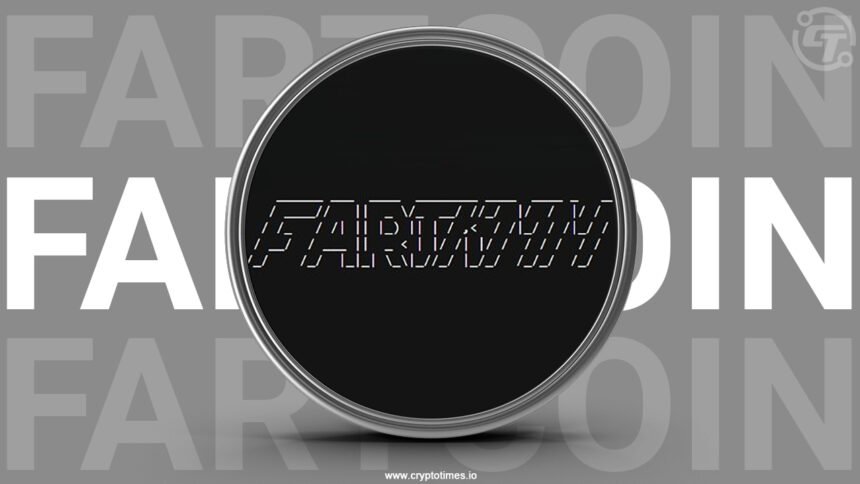In the unpredictable realm of cryptocurrencies, Fartcoin—a self-described \”totally useless\” memecoin—has defied expectations by tripling its value in a week, reaching a market capitalization of over $700 million. Its valuation now rivals established companies like Office Depot and Guess jeanswear, signaling the resurgence of the “carnival-casino” era of cryptocurrencies. While some participants are cashing in, others are facing substantial risks in this volatile market.
The Rise of Memecoins
Memecoins, cryptocurrencies based on internet memes or viral trends, are experiencing renewed popularity. Fartcoin\’s meteoric rise is emblematic of this trend, fueled by speculative trading and a broader surge in bitcoin, which has increased 130% this year. The recent election of Donald Trump has further invigorated the crypto market, driving many bitcoin holders to explore high-risk, high-reward memecoins.
According to Toe Bautista, a research analyst at decentralized finance group GSR, the memecoin phenomenon is attracting two primary groups: seasoned crypto investors moving “down the risk curve” and individuals seeking quick financial gains amid economic challenges. “People think of memecoins as a lottery ticket,” Bautista explained. “You’re betting on someone else paying more for it later.”
Speculation and Risks
The speculative nature of memecoins has made them a high-stakes gamble. Investors hope to “trade up” before the meme underpinning the coin fades from public consciousness. For instance, Peanut the Squirrel-inspired coin PNUT surged in value during its peak, with some holders amassing fortunes. However, as the news cycle shifted, PNUT’s value halved from $2.47, leaving latecomers with substantial losses.
Bautista warns that memecoins rely heavily on the “greater fool theory,” where the only value lies in finding someone willing to pay more for the token. “These coins have no intrinsic value. You’re hoping to sell before the hype dies down,” he said.
Operational Challenges and Scams
The memecoin space is rife with operational risks. Hawk Coin, launched by a podcaster following a viral moment, soared to a $500 million valuation in just 24 hours before collapsing to $28 million amid accusations of insider trading. The coin’s founder denied any wrongdoing, attributing the crash to algorithmic trading bots that sold off holdings as prices surged.
Algorithmic trading, once the domain of Wall Street, is now a significant force in memecoin markets. Bautista estimates that half of the top-20 traded cryptocurrencies are memecoins whose prices are influenced almost entirely by bots.
Websites like Pump.fun have made launching memecoins easier than ever. Launched in 2024, Pump.fun allows users to create instantly tradeable tokens with a single click. While the platform claims to prevent scams by avoiding presales and small-batch allocations, critics argue that it fosters a speculative environment with little accountability. The United Kingdom\’s Financial Conduct Authority recently warned against using the platform, highlighting the lack of investor protections.
Regulatory Ambiguity
The legal status of memecoins remains murky. While the U.S. Securities and Exchange Commission (SEC) has taken action against some crypto exchanges, many memecoins operate in a regulatory gray area. Their decentralized nature and lack of classification as securities have allowed them to thrive despite limited oversight.
For U.S.-based investors, acquiring certain memecoins like Fartcoin can be challenging due to restrictions on major exchanges. This has pushed some traders to use decentralized platforms or overseas accounts, further complicating regulatory enforcement.
The Broader Economic Context
The rise of memecoins also reflects broader societal and economic trends. Omid Malekan, a crypto expert at Columbia Business School, suggests that young investors are turning to memecoins as a form of economic “nihilism.” Facing skyrocketing housing prices and expensive equities, many see speculative crypto trading as their only shot at financial mobility.
“All these kids are like, ‘Stocks are too expensive. Houses are out of reach. I’ll gamble on something that can 10x my money. If I lose, I was already screwed,’” Malekan said.
Tools and Protections for Traders
Amid the chaos, tools like Rugcheck.xyz have emerged to help traders identify potential scams. The platform analyzes memecoin ownership data to detect market manipulation, aiming to prevent “rug pulls,” where creators or insiders dump their holdings after prices surge.
Platforms like Pump.fun also claim to implement measures to prevent sudden market crashes, although their effectiveness remains under scrutiny.
Future Prospects for Memecoins and Crypto
Despite the risks, analysts believe the current cryptocurrency bull market may have room to grow. Factors such as anticipated Federal Reserve interest rate cuts and crypto-friendly policies under the Trump administration could further drive investment in digital assets.
Gracy Chen, CEO of crypto platform Bitget, is optimistic about the future of bitcoin and other cryptocurrencies. “2025 could bring more institutional adoption and regulatory clarity, driving prices higher,” she said.
In Trump’s circle, the embrace of cryptocurrencies is already evident. Bloomberg recently reported that World Liberty Financial, a crypto project tied to Trump, has been buying significant quantities of tokens beyond bitcoin, suggesting that the decentralized finance platform could launch soon.
The memecoin boom, exemplified by Fartcoin’s unlikely success, highlights both the allure and dangers of speculative investing. For some, the rapid gains represent a path to wealth in an uncertain economic landscape. For others, the risks of scams and sudden losses serve as cautionary tales.
As the crypto market evolves, traders must navigate a space that is as unpredictable as it is lucrative. Whether the memecoin trend fades or grows, it has already left a lasting mark on the culture of modern investing.
Sources
- NBC News: Fartcoin and the Rise of Memecoins
- CoinTelegraph: Pump.fun and the Memecoin Economy
- Bloomberg: Trump-Linked Crypto Ventures
- TechCrunch: Algorithmic Trading in Memecoins
- The Verge: Understanding the \”Greater Fool\” Phenomenon

